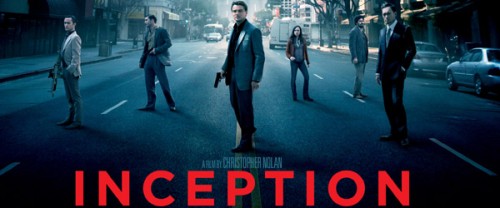
The weakness of “It’s all a dream” — why we hate that, why we feel cheated when narratively anything is revealed to be all a dream — is that you’ve just asked me to spend so much time and emotional capital investing in the stakes of this, and you’ve now swept it away with the most anti-narrative structuralism that doesn’t have anything to substitute in its place. It’s laughing at you for even taking it seriously. You don’t want to feel like a victim of the narrative, and I don’t think Christopher Nolan would do that.
Inception’s Dileep Rao Answers All Your Questions About Inception
Nuanced, brainy and thought-provoking, Christopher Nolan’s provocative sci-fi masterpiece (yeah, I said it) isn’t your typical formulaic summer blockbuster. Even its car chases, gun fights, explosions and special effects wizardry exist on a whole ‘nother level, raised by the sheer audacity of Nolan’s demanding that moviegoers sit still, pay close attention and think hard about what they’re seeing for 2.5 hours rather than be spoon-fed the usual red/blue pablum Hollywood spews out like clockwork from their “me, too” factories.
There’s no filler, no empty calories, no short cuts, no opportune pee breaks; Nolan packs something worthwhile into every second of screen time, and you blink at your own risk. It’s an action movie for intelligent adults who are tired of being treated like teenagers, and it will stick with you long after, whether you loved it or not.
It’s also a call-to-action of sorts for writers and publishers. Or could be, if they’re listening.
“I wanted to do this for a very long time; it’s something I’ve thought about off and on since I was about 16,” Nolan said during a break in shooting last summer. “I wrote the first draft of this script seven or eight years ago, but it goes back much further, this idea of approaching dream and the dream life as another state of reality.”
Much like Obama’s ambitious presidential campaign two years ago, Nolan refused to dumb down his films, and while Inception isn’t perfect, it comes pretty damn close, and in the context of the past decade-plus of movies, when Pixar’s animated blockbusters have demonstrated more originality and creative integrity than most of its live-action counterparts, it’s the perfect film to define The Obama Era.
Inception is as much a philosophical reflection of the complicated times we live in as Avatar’s ham-fisted, CGI allegory was of the narrow-minded Bush Years we’re still recovering from (remember “freedom fries”?), and it is a far superior film because of that. It probably won’t make a bazillion dollars (I’m guessing $210-$225m) like Avatar did, but its successful opening weekend and excellent word-of-mouth suggests there’s a market for intelligent speculative fiction on the big screen…and, by extension, perhaps on the bookshelves as well.
I haven’t read The Passage yet, but many reviews suggest it might be the Inception of Summer books, an exception to the standard forgettable fluff that typically defines the season for all forms of entertainment. The hype around that book is similar to that for Inception, and in relative terms, so is its marketing. I rarely read hardcovers, and eBooks still don’t quite work for me, but I’m considering both because it feels like a book I HAVE to read.
Having recently read (and thoroughly enjoyed) Finch and The Black Minutes, two books I stumbled across via social recommendations and old-fashioned serendipity, respectively, it’s clear that, contrary to popular memes, writers are still writing complex, challenging work, and publishers are still publishing them, in genres often negatively defined by formula and stereotypes, but so few get the kind of marketing push both Inception and The Passage have enjoyed.
Of course, Christopher Nolan’s resume earned him the right to make a smart summer blockbuster with a $160 million budget, and the marketing muscle that goes behind that kind of investment.
Justin Cronin’s resume isn’t nearly so impressive, though.
Says Kristin Fassler, deputy director of marketing at Random House, “Our advertising strategy is modeled after a movie campaign, with phone kiosks and billboards in major markets and banner ads on highly trafficked entertainment Web sites.”
It all amounts to an unprecedented amount of media — and money — for a local university professor.
The lessons?
- Cronin attributes his current success to creative integrity: “I simply wrote the book I wanted to write, the one that wanted to be written.”
- Christopher Nolan’s career to-date is a lesson in creative integrity, and Inception is just one thrilling stop along the road less traveled.
- And no matter your political leanings, the level of creative integrity Obama brought to his presidential campaign is crystal clear.
“Don’t be afraid to dream a little bigger, darling.”
Instead of worrying about the latest trends and what’s on the bestseller list this week, writers should focus on telling the stories they want to tell. And publishers should focus on connecting those stories to the readers who will appreciate them, via every available channel, not simply hoping for intermediaries and serendipity to do their jobs for them.
And, finally, readers who appreciate such challenging work should step up and spread the word about their favorites, at every possible opportunity, rather than waste energy bemoaning the faults of lesser works. Review your favorite books on blogs and social networking sites; tweet recommendations via #fridayreads; give copies of your favorite books as gifts; write letters and send emails to publishers of books you’ve enjoyed and tell them you want more!
Money talks, bullshit walks, and in the age of social media, passionate readers can amplify their actions in ways previously unimagined.
“Yes. We. Can.”
Do you like email?
Sign up here to get my bi-weekly "newsletter" and/or receive every new blog post delivered right to your inbox. (Burner emails are fine. I get it!)



Thanks for the post! I truly believe that you are on the money here, no pun intended. As I have struggled with industry pros telling me that my YA novel is not an easy enough read for the audience it is intended for and that it is like nothing on the shelves today and thus not commercial enough; I continue to refuse to dumb my work down. I respect my readers and the audience of potential readers out there who appreciate an intelligent and complex work which challenges the mind and the senses. After having just seen INCEPTION yesterday–my faith is renewed. Thanks for the post.